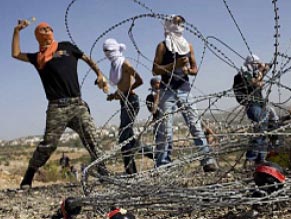|
World Jewish News

Palestinian protesters in the West Bank (photo by Haaretz.com)
|
Foreign Ministry working with rightists against Palestinian incitement
07.05.2010, Israel Last Monday, diplomatic reporters and members of the foreign press corps were invited to a press conference with Deputy Foreign Minister Daniel Ayalon and the director of Palestinian Media Watch, Itamar Marcus, at which PMW's new report on Palestinian incitement against Israel was presented.
The reporters that came witnessed a surreal event, in which the official Foreign Ministry briefing room was turned over to a politically right-wing nongovernmental organization. Though it was Ayalon's office that invited the press, the briefing was conducted by a public relations agent for PMW rather than the Foreign Ministry.
PMW's activities are entirely legitimate, and some of its findings could clearly be categorized as disturbing evidence of anti-Israel incitement. Yet many of the journalists in attendance, who included many representatives of foreign media outlets, were not aware that PMW is led by a right-wing activist, and that many other such activists, from Israel and abroad, are involved in it.
Marcus, in addition to his position with PMW, is also vice president of the New York-based Central Fund of Israel, which provides financial support to a variety of right-wing organizations, such as Im Tirzu, as well as a range of activities in West Bank settlements.
Deputy Foreign Minister Ayalon (Yisrael Beiteinu ) told Haaretz he saw no problem in convening a joint press conference with Palestinian Media Watch. He said the organization had submitted its report to the Foreign Ministry in the same way that social service organizations submit reports to the president.
"But I am in favor of full disclosure, and we are not automatically adopting the report," he said, adding that the report will be studied, and only then will the ministry take a position.
Nevertheless, he continued, the issue of Palestinian incitement is crucial.
"We will cooperate with any organization that discloses facts, regardless of its political affiliation," he said. "We believe in the government joining hands with nongovernmental organizations."
This bizarre press conference was just a symptom of a trend that has emerged in the Foreign Ministry over the last year: After Foreign Minister Avigdor Lieberman declared that he does not want his ministry to be the Ministry for Palestinian Affairs, he distanced Israeli diplomats from almost all activity related to the peace process. Instead, this is being handled by Prime Minister Benjamin Netanyahu's advisors and Defense Minister Ehud Barak.
The Foreign Ministry, with Netanyahu's enthusiastic support, has instead assumed a new role: conducting an aggressive campaign against the Palestinian Authority over alleged incitement against Israel.
But Lieberman, Ayalon and other senior Foreign Ministry officials characterize almost any PA act that is not to their liking as incitement. Thus the ministry lambastes not only Palestinian streets named after terrorists and hate-filled television broadcasts, but also the PA's decision to boycott products made in West Bank settlements and Palestinian efforts to have Israel condemned by the United Nations.
"It's all part of one Palestinian strategy regarding the delegitimization of Israel," Ayalon said.
So far, the campaign against the PA has yielded only modest results. True, many officials in the U.S. State Department, the White House and the French Foreign Ministry now know a great deal about Palestinian terrorist Dalal al-Mughrabi, who took part in a 1978 terrorist attack on a bus on the Coastal Road, and they know that a square has been named after her in Ramallah.
But after noting the details of Israel's protest over the square being named after a terrorist, foreign officials quickly turn their attention to matters of greater interest to them: questions about where Israel's diplomatic policy is headed. And the answers to that are a bit more complex.
By Barak Ravid
Haaretz.com
|
|
